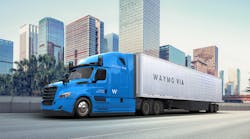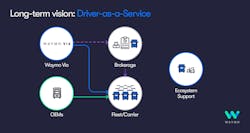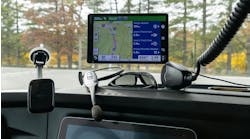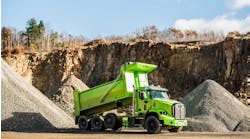More fleets and shippers will get to see how autonomous long-haul trucking could bolster their freight networks this year when logistics giant C.H. Robinson gets access to Waymo’s self-driving trucks.
Waymo Via, the technology company’s trucking division, announced on Feb. 16 a long-term strategic partnership with C.H. Robinson to explore how its technology could bolster supply chains and future fleets. That partnership will begin with pilot freight runs between Dallas and Houston with Waymo’s test fleet for select C.H. Robinson customers, according to Chris O’Brien, chief commercial officer at C.H. Robinson.
“We really see this as much more than the pilot—and that's where it gets more interesting,” O’Brien said during a media briefing in advance of the announcement. “It does lay the groundwork for us to explore C.H. Robinson’s freight network, the largest in North America, being among the earliest to use Waymo Via’s L4 autonomous driving tech.
See also: Fleets will soon have a selection of self-driving truck products
This is the latest in a growing list of logistics companies partnering with AV trucking companies to develop humanless long-haul freight networks. Waymo rival Embark Trucks recently sold AV-powered tractors to Knight-Swift (the fourth largest for-hire carrier, according to the FleetOwner 500). Knight-Swift will operate with self-driving trucks with fleet drivers inside the cab to gather system feedback for Embark. TuSimple, one of the early leaders in AV, has been delivering freight for large fleets, such as UPS, on its growing Autonomous Freight Network for years. So has Kodiak Robotics, which runs freight along the same 240-mile Dallas-to-Houston freight corridor.
Waymo is also no stranger to leaning on large trucking fleets for data. It is working with Ryder Systems and its network of 500 U.S. trucking maintenance facilities on how to scale up maintenance operations for fleets of autonomous Class 8 trucks. And Waymo's fleet has hauled freight for J.B. Hunt and UPS. However, this program with C.H. Robinson will focus on how AVs can work for medium and small fleets, O’Brien said.
Utilizing C.H. Robinson's shipper and carrier network for AV development
Later this year, a top C.H. Robinson customer will be its first to use Waymo’s research-and-development fleet to deliver freight in Texas, according to Charlie Jatt, Waymo’s head of commercialization for trucking. The pilot project will include safety operators in the trucks.
“We're excited about innovating together both in the short term in the long term to help both the driver experience as well as help carriers find efficiencies in their business,” O’Brien added. “And ultimately to our shipper customers everywhere, who face a long-term driver shortage and extremely constrained capacity, bringing away long-term solution to that as well.”
C.H. Robinson’s network includes almost 200,000 shippers and carriers contributing to data on more than 3 million lanes. Waymo leaders believe this data will help the technology company scale its product offerings for fleets. Waymo is interested in how the pilots work for small- and medium-size fleets partners as it fine-tunes its Driver-as-a-Service business model.
“Together, we can combine C.H. Robinson’s logistics expertise and scale of data with Waymo Via’s technology expertise to help tailor this new product to the specific needs of the logistics industry and apply it where it promises the most benefit,” Jatt said. “That's a powerful combination, and we believe that's an important component of delivering economic viability of AV technology in the logistics industry.”
Creating an AV product for fleets
Jatt said Waymo has no intentions to build a commercial fleet. Instead, it is developing the Waymo Driver with major commercial vehicle OEMs, including Daimler Truck North America, to build redundant trucks designed for and equipped with the Waymo Driver. Under this model, fleets would purchase the self-driving trucks, and Waymo Via would provide deployment support and ongoing services for our hardware and software components.
O'Brien said about 85,000 trucking companies are part of C.H. Robinson’s network. “We think we are uniquely positioned to represent those small- and medium-size carriers in a more autonomous world,” he said. “They haven’t necessarily been some of the early targets of the AV industry so far.”
O’Brien noted that fleets with 400 or fewer tractors make up 83% of all for-hire capacity on North American roads today—while the largest carriers with at least 4,000 tractors make up about 7% of capacity. “We work with carriers of all sizes,” he said. “But one thing we think we can uniquely do with Waymo is usher this in in a way that includes the voice of the small and medium-size carrier, bringing that efficiency and time savings to them.”
With a growing professional truck driver shortage exacerbated during the COVID-19 pandemic as e-commerce grew, O’Brien said more drivers seek regional trucking jobs over long-haul jobs.
“We see ultimately that long-haul autonomous trucking could be like a new mode of transportation and one that provides relief to the driver shortage itself—but one that can also accelerate the growth of driver-attractive, short-haul freight when you think about those local pickups and deliveries that will support long-haul autonomous,” O’Brien said.
With a focus on uptime and reducing empty miles, Jatt believes AV technology could enable fleets “to operate at the highest level of efficiency for their business.”
That increased efficiency is vital for the industry, O’Brien said. He said that between 10% to 20% of C.H. Robinson customer fleets could run empty miles. “We did research recently about their biggest pain points,” he explained. “Tight capacity remains the No. 1 challenge, and finding efficient ways to deal with that is a No. 1 goal. So we see this partnership long-term as helping to accelerate this development.”





